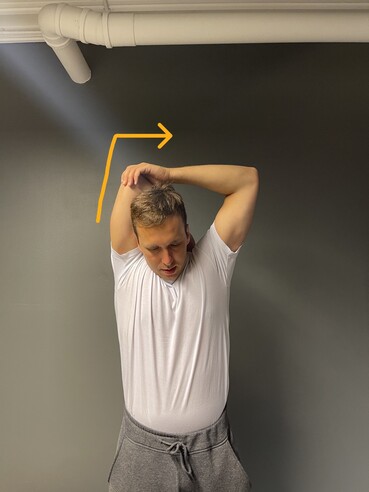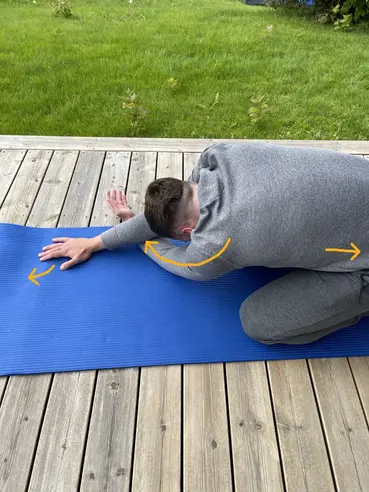Best Teres Major Stretches to Improve Shoulder Flexibility
In this article I will show you the best teres major stretches to relieve tension in teres major muscle and to prevent teres major injury.
Beside learning how to stretch teres major muscle, you will learn also:
- Anatomy and function of teres major
- Common issues and symptoms
- Benefits of stretching teres major muscle
- Tips when stretching
And much more. Let’s get started.
4 Best Teres Major Stretches for Shoulder
Here is how to perform teres major stretch in a few simple steps.
Standing Teres Major Stretch
- From a standing position, grab one of your arms around your wrist
- Then push your arm upward and to the opposite side while holding your back still.
- When you experience the pleasant stretching in the upper back (between shoulder blade and shoulder joint), hold for 30s.
This is the most popular teres major stretch.
Teres Major and Triceps Brachii Stretch
- From a standing position, place one arm above your head and bend your elbow
- Pull your elbow to the opposite side with your other arm
- Hold this stretch for 30s
This stretch is also a part of a latissimus stretching routine I created in a separate article.
Cross arm Stretch
Sit on Heels Teres Major Stretch
Start by sit on a heel stance. Then:
- Cross your arms
- Gently press your upper body towards the ground while holding your shoulder blade toward your spine
- Hold this stretch for 30s
This stretch is great for stretching the infraspinatus muscle as well.
Anatomy and Function of the Teres Major
Thick and rectangular muscle which originates from the lower posterior (back) part of a shoulder blade (scapula) and goes all the way to the humerus. Both triceps long head and latissimus dorsi tendon are in the neighborhood of teres major attachment site on the humerus.
The main function of teres major muscle is to extend, adduct and internally (medially) rotate the humerus (arm bone). Additionally, teres major muscle helps with stabilization of the humeral head (shoulder joint) together with latissimus dorsi muscle. They are basically active as one muscle unit, but separate injuries can occur.
Together with rotator cuff muscles and pectoralis major and minor muscle, these muscles are crucial to prevent subluxation of the shoulder joint.
Teres major muscle is very active in sports like tennis, baseball, swimming, rowing and rock climbing.
Learn more: Anatomy, Shoulder and Upper Limb, Teres Major Muscle
Common Issues and Symptoms
Even though the major muscle is working together with lats, teres major injury can occur and it usually occurs when overstretching or from a direct trauma.
On the other side, a hypertrophied, overused and tight teres major lead to changes in scapulohumeral motion.
Scapulohumeral motion: as you move your arm, the shoulder blade (scapula) follows the humerus bone to a certain degree. This motion is basically determined by muscles that attach to the shoulder-blade and/or humerus. (like teres major muscle do)
Tightness in teres major lead to increased scapular upward rotation when lifting arms over 90 degrees, as well to decreased humeral elevation.
Additionally, tight teres major is more prone to strain injuries. Teres major strain symptoms are pain and/or weakness when internally rotating the arm. Teres major strain often occurs when proper warm-up is not done before workouts. Learn more about teres major injuries.
Teres major rehabilitation consists of:
- The POLICE principle (protection, optimal loading, ice, compression, elevation)
- Learning the proper warm-up, including massage techniques
- Strengthening the teres major muscle, both with compound and isolated teres major exercises
- Avoiding the vertical overhead presses
- Flexibility: stretching the teres major, both statically and dynamically
- Posture: avoiding the rounded shoulders posture
By following these guidelines, you should experience teres major muscle pain relief over time. If you experience any pain in your body, please consult with your healthcare provider.
Benefits of Stretching Teres Major
- Increasing the range of motion in the shoulder joint (lifting your arm overhead)
- Improving the health of a shoulder joint by having a more effective scapulohumeral rhythm
- Improving athletic performance in throwing sports or in bodybuilding/weightlifting
- Teres major injury prevention
- Preventing the excessive shoulder blade upward rotation when lifting your arms
- Combating the rounded shoulders posture (thoracic kyphosis)
Tips When Stretching Teres Major
- When stretching teres major muscle, always make sure you’re holding your shoulder blade close to your spine (shoulder blade adduction) before and during teres major stretch
- Perform static hold for 30s when stretching teres major muscle
- Breathe deeply and slowly go into a deeper stretch
- Don’t stretch only teres major muscle, add some stretches for pectoralis major, upper trapezius and triceps brachi, to ensure good functioning shoulders
Do other teres minor exercises. Build strength in your upper back.
Conclusion
Teres major is often a neglected muscle since the focus is more on lats and rotator cuff muscles when people talk about shoulder exercises and function, but teres major muscle plays an important role in shoulder function (scapulohumeral rhythm). Stretching teres major will benefit you with less shoulder injury, increased range of motion and easier shoulder motion in overhead activities.
One of the best teres major stretches you can do is from a standing position: lift your arm up and to the opposite side (horizontal adduction), grab your underarm with other hand, and push your arm to the opposite side and upward. Hold for 30s.
Want to learn the best stretching techniques (like PNF) and have a constant access to the most effective stretches for every body part? Then you should check out this stretching guide I created. Everything I collected over the years (knowledge and experience) in one ebook.


